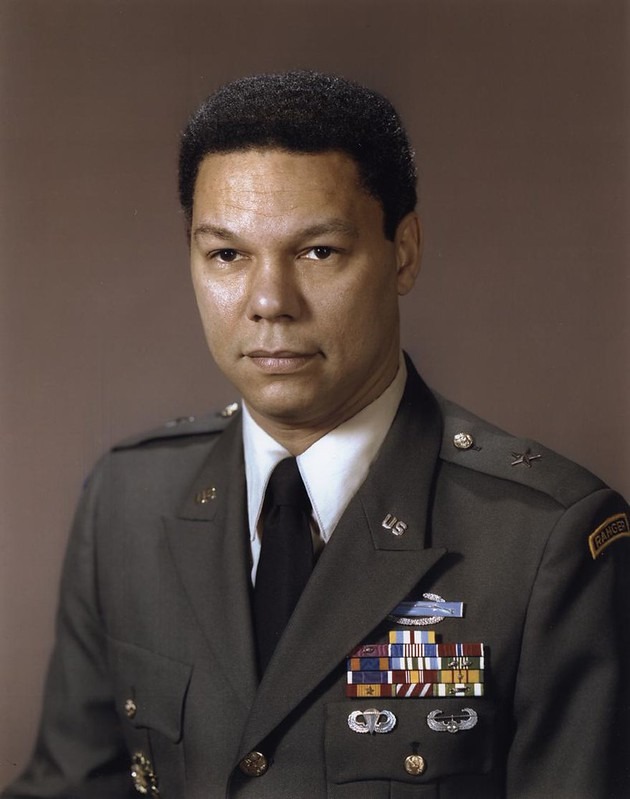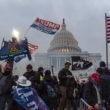The cause of General Colin Powell’s passing will be recorded on his death certificate as complications from Covid-19. But his vulnerability to a rare breakthrough infection was the result of two underlying conditions, Parkinson’s disease and multiple myeloma, a cancer of the blood that destroys the bone marrow cells that strengthen the immune system. Those diseases, both incurable, shine a light on an often forgotten period in Powell’s long and distinguished career. Both are now on the Veterans’ Administration’s list of diseases presumptively associated with service in Vietnam and exposure to the chemical defoliant known as Agent Orange.
Every veteran who served in Vietnam between 1961 and 1975 is entitled to benefits if he or she subsequently suffers from one of a list of eight types of cancer and nine other diseases, regardless of proof of direct exposure to the chemical. But Powell’s case is unusual. He was not only exposed to the defoliants; he directly accompanied the unit of South Vietnamese soldiers who were spraying them, in one of the earliest and most controversial missions of the war. Not only that, but the chemical used by the troops he was advising was not Agent Orange, but its little-known precursor, Agent Purple. This substance was composed of the same 50-50 mix of two chemical ingredients, 2,4-D and 2,4,5-T, but was roughly three times as contaminated by TCDD-dioxin, generally considered to be one of the most toxic substances ever created. The use of Agent Purple was phased out in 1965 after the introduction of Agent Orange, which was less expensive to produce.
The mission on which Powell’s men used Agent Purple took place in February 1963, when he was a young Army captain assigned to the Special Forces base at A Shau, in a remote mountain valley on the border with Laos. The most important North Vietnamese bastion inside South Vietnam, the valley was one of its most fearsome battlefields, best remembered for the carnage in May 1969 at Dong Ap Bia, the Mountain of the Crouching Beast. Americans called it Hamburger Hill for the hundred or more Americans who died there, along with perhaps ten times as many North Vietnamese fighters.
Among the generals and civilian politicians who debated the use of toxic chemicals in warfare, the most controversial element was not the defoliation of the forest cover that concealed enemy troops, but the destruction of the crops that might feed them. When scientists proposed the destruction of the Japanese rice crop in 1944, FDR’s chief of staff, Admiral William Leahy, vetoed the idea, saying that it “would violate every Christian ethic I have ever heard of and all known laws of war.” JFK felt much the same way, and when the first targets for defoliation were proposed in 1962 he strongly opposed all missions aimed at enemy crop fields, for fear they would harm and antagonize the peasant farmers that the United States was ostensibly there to protect and defend.
But JFK’s military commanders overcame his well-documented resistance by stressing the strategic importance of the A Shau Valley, a terminus for the Ho Chi Minh Trail just below the Demilitarized Zone that divided North and South Vietnam. Helicopters delivered 55-gallon barrels of Agent Purple to the A Shau base, and after decanting the chemical into backpack sprayers, Powell’s men used it on eight separate occasions, destroying 29 acres of manioc and sweet potatoes. By the time the herbicide campaign, Operation Ranch Hand, ended in 1971, some 500,000 acres—about 780 square miles—of crop fields had been destroyed. This was accomplished with the use of several of the so-called rainbow chemicals—Agents Purple, Orange, White, and Blue (a powerful arsenical compound). In all, more than 19 million gallons of toxic herbicides were sprayed on South Vietnam in the course of the war.
Powell was invalided out of his first tour of duty after just six months, when a punji stick—a sharpened stake of bamboo that was probably contaminated with excrement—went clean through his foot. But he returned for a second tour in July 1968, by this time promoted to major. His assignment took him initially to Duc Pho, a small base in Quang Ngai province, a longtime stronghold of the National Liberation Front, or Viet Cong. Here he almost certainly encountered a second element of the herbicide campaign that was separate from Operation Ranch Hand and overseen not by the Air Force but the Army Chemical Corps. The perimeter of bases like Duc Pho, and the surrounding helicopter landing zones and fire support bases that Powell visited while he was there, were routinely sprayed by ground crews and helicopters to keep down vegetation for protection against enemy attack.
After two months he was transferred to nearby Chu Lai to serve as chief of operations for the Americal Division, a company of which had carried out the worst known massacre of the war in the village of My Lai six months before his arrival. Again, herbicides were used frequently at the Chu Lai base and the surrounding support facilities while Powell was there, and the whole of Quang Ngai province was heavily sprayed. Declassified Air Force records make it possible to reconstruct these operations with considerable precision. Some 220,000 gallons were sprayed on Quang Ngai in 1968 and 1969. About 80 percent were Agent Orange; the remainder were Agents White and Blue.
After the war ended, Vietnam veterans fought a bitter battle for recognition that their postwar cancers and other diseases, as well as the birth defects suffered by their children, might be attributable to their exposure to the toxic defoliants. It was not until 1991, with the Agent Orange Act, that their plight was fully acknowledged. Although it was, and remains, impossible to show cause-and-effect in individual cases, the Act gave vets the benefit of the doubt, in a kind of moral atonement for the years of ostracism they had suffered in the wake of the first foreign war the United States had ever lost. It mandated the Institute of Medicine and the V.A. to continue studying the effects of dioxin on veterans’ health, and over the years more diseases were added to the original list. These included the two from which Powell was suffering: multiple myeloma and, most recently, Parkinson’s disease.
Like Powell, the Vietnam generation is now aging, growing sicker, and dying, and the V.A., too often an orphan stepchild among government agencies, continues to review their requests for compensation. Still, many applications are rejected. In the decades after the war, the Air Force’s chief toxicologist, Alvin “Dr. Orange” Young, consistently denied that the defoliants had any demonstrated impact on human health and made, in his own words, “a few million dollars” by consulting for the Defense Department and the V.A., which often relied on his advice to deny benefits to sick veterans he dismissed as “freeloaders” trying to “cash in” on the compensation program.
For decades, the conditions in our V.A. hospitals have been a national disgrace, and no facility has been more notorious than the Department of Veterans Affairs Medical Center in Washington, D.C. Just ten miles away, at the Walter Reed Army Medical Center, Colin Powell received the superb care that he richly deserved for his long years of service. But thousands of others have been less fortunate, and it would be a fine addition to Powell’s legacy if his death served to dramatize not only the continued scourge of Covid-19, but the enduring pain of so many of his fellow Vietnam veterans.
George Black is working on a book on the legacies of the war in Vietnam, to be published by Knopf.






Charles
This is a well written and well sourced article and great media contribution. Thanks for doing it.
The US Vietnam Era veterans appreciate your effort to tell their story through General Powell back story.
Ken Olson
I always appreciate outside info
from any non-profit and overseer of our politicians’ self-interests and demeaning American armed forces personnel and needs
everyone wants their “rights” very few will admit how they are protected
just because they believe its always “over there”
THNKS